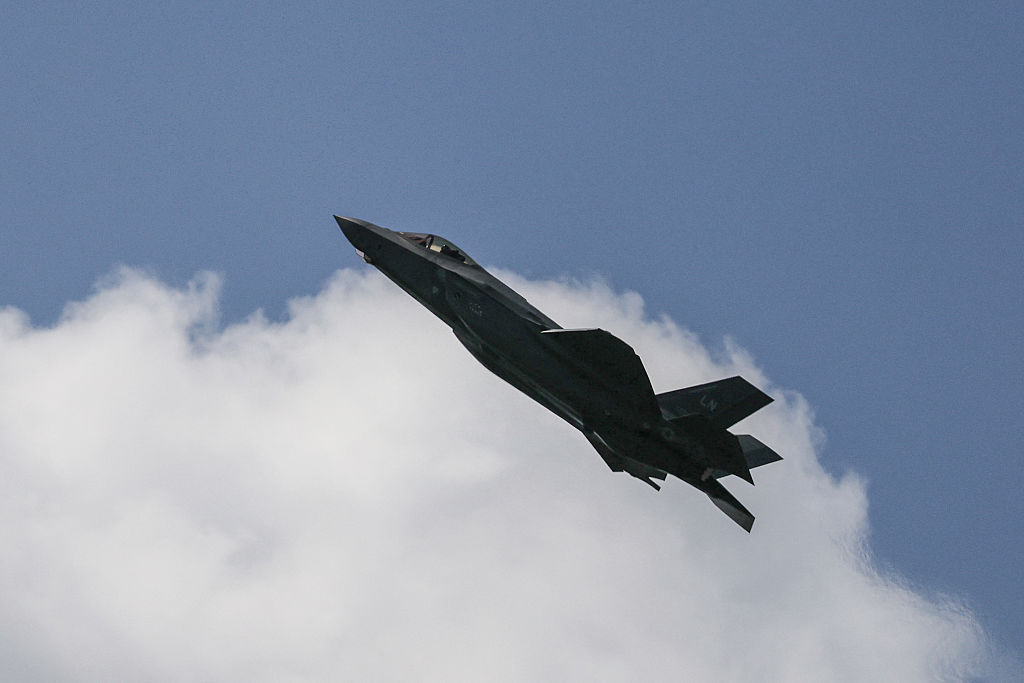If Defence Secretary John Healey didn’t have an anxious and unsettled weekend, he should have done. The Ministry of Defence once again has serious questions to answer over equipment, this time the F-35 strike aircraft programme, the cutting edge of the Royal Air Force’s offensive capabilities.
It is a political commonplace that our executive faces inadequate parliamentary scrutiny, but there is one institution which can still cause ministerial pulses to quicken in panic: the National Audit Office (NAO). Established just over 40 years ago, the NAO carries out financial audits and value-for-money surveys on government departments. Essentially, it is the independent watchdog of public expenditure, and its head, the comptroller and auditor general, is an officer of the House of Commons, not a civil servant.
This blind refusal to accept that anything is amiss is insulting and deeply worrying
On Friday last week, the NAO published a report on ‘the UK’s F-35 capability’, examining the procurement, operation and maintenance of the jointly operated RAF/Royal Navy fleet of Lockheed Martin F-35B Lightning multi-role strike fighters. Its conclusions, by any reasonable reading, were delivered with asperity; at worst, they were damning.
The UK first became a partner in the United States-based design of the F-35m in 1995, and the programme has been beset by a range of problems over the intervening decades. Successive governments have exacerbated the situation: in 2010, the Ministry of Defence decided to switch from the F-35B variant to the F-35C, then reversed the decision two years later. Typically of the MoD, financial decisions have repeatedly been deferred in vain and usually counter-productive attempts to save money.
The headlines from the NAO’s report are plain. Of the 138 F-35s the UK has ordered, 37 are in service, but there is no schedule for the remaining aircraft. The programme has already cost £11 billion, and the MoD estimates the whole-life cost, keeping the aircraft flying until 2069, will cost £57 billion; until recently it insisted it would be £19 billion. The NAO estimates it will be £71 billion.
The programme is at least two years behind schedule, and the ability of the aircraft to fire long-range ‘stand-off’ missiles will not be achieved until the 2030s. In 2024, the F-35 fleet was only available to carry out all seven missions required of it by the MoD a third of the time; one time in two, it was available to perform at least one of those seven missions. Shortages of engineers and spare parts have meant that pilots have not been able to log enough flying time for training and development.
Bluntly, the MoD is paying vastly more than it expected over a longer time period for aircraft that are not currently able to perform all the functions for which they are required. Some of these problems are being addressed, but on others there is silence. This is not just the fault of the current government, of course. The dysfunctional roots of the programme go back decades. But John Healey happens to be holding the baby at the moment.
The appropriate response from the MoD would have been acknowledgement of responsibility, a degree of contrition and a clear, straightforward plan explaining what would be done to address or at least mitigate the myriad problems the NAO identified. That was not how the MoD reacted:
The National Audit Office’s report rightly recognises the world-class capabilities of the F-35 fighter jet, as well as its significant economic benefits – including £22 billion of work for UK companies, creating thousands of jobs. The programme continues to operate within its approved budget, and the UK will have two full squadrons of F-35 fighter jets ready for deployment by the end of this year.
It is true the NAO noted the advanced capabilities of the F-35, but the MoD addresses none of the failings, claims that it ‘continues’ to operate within budget (which the NAO contests) and points to the economic benefits, as if the F-35 was a job creation scheme.
I don’t expect the programme’s senior responsible officer to commit seppuku on the steps of the MoD. But this blind refusal, which senior civil servants and military officers have displayed repeatedly, to accept that anything is amiss is insulting and deeply worrying. If they won’t admit what has gone wrong, do they know? If they don’t know, how will they stop it happening again?
Healey’s Defence Reform programme has created a new National Armaments Directorate to manage procurement, though the director is yet to be appointed. But it is hard to see what he or she will be able to do unless there is a dramatic change of culture at the MoD. Only ministers can achieve that change. I hope John Healey did a lot of thinking over the weekend.








Comments